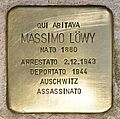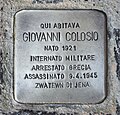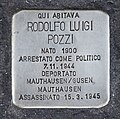Wikipedia:WikiProject Stolpersteine/Stolpersteine at the Lake Garda, in Gavardo and Sarezzo

Stolpersteine is the German name for small, cobble stone-sized memorials collocated all over Europe by German artist Gunter Demnig. They remember the fate of the victims of Nazi Germany being murdered, deported, exiled or driven to suicide. The first Stolpersteine in Milan, the capital of the Italian region of Lombardia, were collocated in January 2017.
Generally, the stumbling blocks are posed in front of the building where the victims had their last self chosen residence. The name of the Stolpersteine in Italian is pietre d'inciampo.
The list is sortable; the basic order follows the alphabet according to the last name of the victim.
Background[edit]
>RSI aldo Finzi/Mirano >The three major victim groups >Partisans >Jews >I.M.I.
| Stone | Inscription | Location | Life and death |
|---|---|---|---|

|
HERE LIVED
MASSIMO LÖWY BORN 1880 ARRESTED 2.12.1943 DEPORTED 1944 AUSCHWITZ MURDERED |
Salò, Via Rive Grandi 13 45°36′48″N 10°33′08″E / 45.613472°N 10.552208°E |
Massimo Löwy |

|
HERE LIVED
ALFREDO RUSSO BORN 1871 ARRESTED DEC. 1943 DEPORTED 1944 AUSCHWITZ MURDERED 26.2.1944 |
Gardone Riviera, Vicolo ars 10 45°37′09″N 10°33′35″E / 45.619268°N 10.559815°E |
Alfredo Russo was born in Vienna on 25 September 1871. His parents were Israele Russo and Clara Salom. He was a operatic singer, already retired, who lived in Merano. When the prefect of Bolzano in July 1939 commanded that all "foreign Jews" had to leave the province within 48 hours, Russo fled from South Tyrol. On 11 September 1939, he was registered in Gardone Riviera, first in Corso Zanardelli 24, then on 17 April 1940, in a room for rent on Via Roma 91 (now Vicolo Ars 10). At that time he could not know that Salò would once become the headquarters of Mussolini's Social Republic within a few years. In June of 1941 his stay changed to "free internment". In December 1943 he was arrested by Italians, detained in Salò's jail, and subsequently taken to the prison of Canton Mombello in Brescia. In January 1944, a lady of Meran, Luisa Lerber Countess Saracini, intervened at the prefect of Brescia, describing Alfredo Russo as follows: "He lived 40 years in Merano, a member of the Civic Theater [...] considered a singer of value [...]. His pension was lifted and his wife, preferring to join an "Aryan", left him for a rich prestinaio in Innsbruck. He is 73 years old, he is sick of arthritis, the prison kills him, his pains are unbearable, his hands contracted and can not any longer open his fingers. " Nevertheless, Alfred Russo was transferred to the Fossoli transit camp. On 22 February 1944 he was deported with convoy no. 8 to Auschwitz concentration camp. He was part of the same convoy as Primo Levi and 650 other Jews. He was eliminated on arrival at Auschwitz on 26 February 1944.[1][2][3] |
| Stone | Inscription | Location | Life and death |
|---|---|---|---|

|
HERE WORKED
DAVIDE ARDITI BORN 1883 ARRESTED 22.12.1943 DEPORTED AUSCHWITZ MURDERED 26.2.1944 |
Via Benecco 32 (Soprazocco) 45°35′44″N 10°28′51″E / 45.595418°N 10.480742°E |
Davide Arditi |

|
HERE LIVED
RIVKA JEROCHAN BORN 1910 ARRESTED 22.12.1943 DEPORTED AUSCHWITZ MURDERED AT AN UNKNOWN PLACE |
Via Benecco 32 (Soprazocco) 45°35′44″N 10°28′51″E / 45.595418°N 10.480742°E |
Rivka Jerochan |
KOORDINATEN!!! are wrong
| Stone | Inscription | Location | Life and death |
|---|---|---|---|

|
HERE LIVED
SPARTACO BELLERI BORN 1920 ARRESTED FOR POLITICAL REASONS 7.11.1944 DEPORTED MAUTHAUSEN MURDERED 15.3.1945 |
Via Marconi 3 45°40′18″N 10°11′20″E / 45.671722°N 10.188849°E |
|

|
HERE LIVED
GIOVANNI COLOSIO BORN 1921 INTERNED MILITARY ARRESTED IN GREECE MURDERED 9.4.1945 ZWATEWN OF JENA |
Piazza Cesare Battisti 18 45°39′14″N 10°12′12″E / 45.653876°N 10.203449°E |
Giovanni Colosio was born on 4 January 1921 in Sarezzo. His parents were Angelo Colosio and Antonia Zani. He was the second of five siblings. He hobbled after an accident with a sled. He was a worker. On 11 January 1941, he was called to the arms despite his physical handicap. He had to consult the Piacenza military hospital several times and obtained a special license for 15 days in June 1943. After the armistice of Cassibile, he did not adhere to the Italian Social Republic. He was arrested by Germans and deported as I.M.I. In the Kahla camp in Thuringia, where the Nazis built a gigantic underground complex for weapons fabrication. They used at least 12,000 forced laborers from all over Europe, of whom at least 2,000 died due to exhaustion and catastrophic conditions in the camp. On 9 April 1945, the young man lost his live in Jena.[6] |

|
HERE LIVED
ANTONIO PEDERGNAGA BORN 1918 INTERNED MILITARY ARRESTED IN SAN CANDIDO MURDERED 9.5.1944 LEIPZIG |
Via Nord 26 45°39′20″N 10°12′18″E / 45.6556326°N 10.204909000000043°E |
Antonio Battista Pedergnaga was born on 16 May 1918. His parents were Angelo Pedergnaga and Alceste Marianini. He had four brothers. He was very much engaged emotionally with his mother and engaged in work and study. By day he was studying to obtain a Master's degree, working at night at Bosio steel mills. On 31 March 1939 he was called to arms. He spent his military service at San Candido in the province of Bolzano. From June to December 1941 he regularly attended the hospital there for unknown problems. After the armistice of Cassibile, he was arrested by the Germans and deported as I.M.I. to the Kahla camp in Thuringia, where the Nazis built a gigantic underground complex for weapons factories. They used at least 12,000 forced laborers from all over Europe. On 9 May 1944 Antonio Pedergnaga declared dead in Leipzig.[7] |

|
HERE LIVED
MARIO POZZI BORN 1921 ARRESTED FOR POLITICAL REASONS 7.11.1944 DEPORTED MAUTHAUSEN MELK MURDERED 24.3.1945 |
Via Dante Alighieri 150 45°40′00″N 10°11′37″E / 45.666785°N 10.193480°E |
Mario Pozzi was born on 12 December 1899 in Milan. S |

|
HERE LIVED
PIETRO VITTORIO POZZI BORN 1892 ARRESTED FOR POLITICAL REASONS 7.11.1944 DEPORTED MAUTHAUSEN MELK MURDERED 11.3.1945 |
Via Dante Alighieri 150 45°40′00″N 10°11′37″E / 45.666785°N 10.193480°E |
Pietro Vittorio Pozzi was born on 12 December 1899 in Milan. S |

|
HERE LIVED
RODOLFO LUIGI POZZI BORN 1900 ARRESTED FOR POLITICAL REASONS 7.11.1944 DEPORTED MAUTHAUSEN/GUSEN MAUTHAUSEN MURDERED 15.3.1945 |
Via Dante Alighieri 150 45°40′00″N 10°11′37″E / 45.666785°N 10.193480°E |
Rodolfo Luigi Pozzi was born on 12 December 1899 in Milan. S |
Collocation dates[edit]
The Stolpersteine in this region were all collocated by Gunter Demnig personally on the following days:
- 11 January 2014: Sarezzo
- 12 January 2015: Gavardo
- 18 January 2016: Gardone Riviera, Salò
See also[edit]
External links[edit]
- Stolpersteine.eu, official website of Gunter Demnig
References[edit]
- ^ Yad Vashem: ALFREDO RUSSO, consultato 1 agosto 2017
- ^ GardaPost: Gardone ricorda Alfredo Russo, 9 gennaio 2016, consultato 1 agosto 2017
- ^ Prassede Gnecchi: Alfredo Russo, Cooperativa cattolico-democratica di cultura, consultato 3 agosto 2017
- ^ Memorie d'inciampo: Belleri Spartaco, 11 January 2014, retrieved on 31 July 2017
- ^ Stanze di nomi, I morti del KZ Mauthausen: Spartaco Belleri 1920 - 1945, retrieved on 31 July 2017 (with a portrait)
- ^ Memorie d'inciampo: Giovanni Francesco Colosio, 11 January 2014, retrieved on 31 July 2017
- ^ Memorie d'inciampo: Sarezzo: Antonio Battista Pedergnaga, 11 January 2014, retrieved on 31 July 2017
- ^ : [], retrieved on 31 July 2017
- ^ : [], retrieved on 31 July 2017
- ^ : [], retrieved on 31 July 2017
- ^ : [], retrieved on 31 July 2017
- ^ : [], retrieved on 31 July 2017
- ^ : [], retrieved on 31 July 2017
- ^ : [], retrieved on 31 July 2017
- ^ : [], retrieved on 31 July 2017
- ^ : [], retrieved on 31 July 2017
